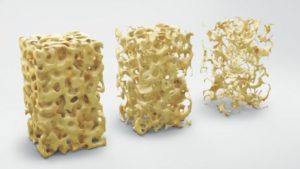 If you suffer from osteoporosis, you’re not alone. Sadly, it’s been estimated that over half of Americans over age 50 are at risk for breaking a bone because of this common condition. Other risk factors that are associated with it include chronic pain, back problems and even disability. While you were probably already aware of these risks to your overall health, you may not have known that osteoporosis can also affect your dental health as well. In this blog, you’ll find out how osteoporosis can affect your teeth and gums – and why it’s so important to talk to your dentist in Dayton about it as soon as possible. Learn more today!
If you suffer from osteoporosis, you’re not alone. Sadly, it’s been estimated that over half of Americans over age 50 are at risk for breaking a bone because of this common condition. Other risk factors that are associated with it include chronic pain, back problems and even disability. While you were probably already aware of these risks to your overall health, you may not have known that osteoporosis can also affect your dental health as well. In this blog, you’ll find out how osteoporosis can affect your teeth and gums – and why it’s so important to talk to your dentist in Dayton about it as soon as possible. Learn more today!
How Does Osteoporosis Affect Your Dental Health?
Many people think that their mouth is separate from the rest of their body, but the health of one affects the health of the other.
Osteoporosis is a great example. It affects all the bones in your body, including the jawbone that keeps your teeth in place. In fact, in many cases, dentists can see the progression of the disease in X-rays as the bone mass in the jaws is lost over time. These changes in your jaws can ultimately lead to tooth loss.
For people with dentures, it can cause the dentures to become loose and ill-fitting more quickly than they normally would. And patients with implants have a higher risk for implant failure if they develop osteoporosis.
Furthermore, osteoporosis increases the risk for a condition called osteonecrosis, which occurs when the blood supply to the oral cavity is reduced, causing the bone tissue to die. Here are some of the symptoms associated with osteonecrosis:
- Pain or swelling in the gum tissue or jaws
- Exposed bone
- Loose teeth
- A “heavy” or numb feeling in the jaws
- Injured gum tissue that doesn’t heal
Osteonecrosis can cause serious complications during dental procedures such as extractions, so your dentist will evaluate your medical history beforehand and make treatment recommendations as necessary.
How Can You Reduce the Impact On Your Oral Health?
If you’ve been diagnosed with osteoporosis, start by talking to your dentist at your next checkup about your diagnosis. It’s also crucial to let them know which medications you’re taking, as bisphosphonates (a common medication for osteoporosis) increases the risk for osteonecrosis.
In addition to talking with your dentist, it’s important that you maintain good hygiene habits and get regular checkups and cleanings. The cleaner your teeth and gums are, the fewer problems you’ll have.
Also, regular dental visits are a chance to have the gums and underlying bone closely monitored so that any potential problems can be caught as early as possible.
Osteoporosis can affect your entire body, but following these guidelines reduces the chance that it will affect your smile!
About the Author
Dr. Mike Allport is a general dentist in Dayton who always educates his patients about the connection between osteoporosis and their dental health. He also thoroughly evaluates their medical histories at each appointment so he can provide the best comprehensive care possible. If you have osteoporosis and have any additional questions, he can be reached via his website or at (423) 775-9971.
